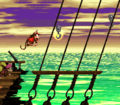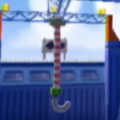Hook
| Hook | |
|---|---|
Sprite from Donkey Kong Country 2: Diddy's Kong Quest | |
| First appearance | Donkey Kong Country 2: Diddy's Kong Quest (1995) |
| Latest appearance | Super Mario 3D All-Stars (2020) |
| Effect | Climbable support used to reach other areas |
In Super Mario-related games, hooks appear as environmental fixtures and are always positioned downward. The player character can jump and cling to a hook, enabling them to transverse over gaps and reach higher areas. Hooks have only appeared in shipyard levels.
History
Donkey Kong franchise
Donkey Kong Country 2: Diddy's Kong Quest
Hooks first appear in Donkey Kong Country 2: Diddy's Kong Quest. Diddy Kong and Dixie Kong use them to reach higher areas and cross gaps. Whenever the Kongs jump at a hook, they hang from it automatically: Diddy hangs from his tail, and Dixie hangs from her ponytail. To get off a hook, the Kongs have to either jump from it or drop right below it. Hooks often appear in groups, requiring several of them to be jumped from. The Kongs cannot grab on to a hook while they are carrying an object, and none of the Animal Friends can grab on to a hook. Diddy or Dixie can use team up to throw the other Kong on a hook as a way for both to hang from it automatically. Hooks are often used to reach collectible items, such as a Banana Coin and a Red Balloon, or even to enter a Bonus Barrel. Some of the hooks are invisible at first, but they can be made visible by touching them. Some of the invisible hooks' locations are hinted at by a trail of bananas.
For regular levels, hooks first appear in Gangplank Galley, where the first hooks are used to collect the Video Game Hero Coin at the start, and the level's Bonus Level even involves Diddy and Dixie having to jump from several hooks to reach the Kremkoin. In certain levels, hooks appear at the end of Gangplank Galley and some other levels, where jumping from them is the only way the Kongs can land on an End of Level Target with enough force to win one of its prizes. During the first half of Topsail Trouble, hooks are an alternative way for Diddy and Dixie to progress farther into the level rather than by using Rattly's Superjump ability.
Hooks prominently appear in the Crocodile Cauldron boss level, Kleever's Kiln. During the first portion, whenever Diddy or Dixie throws a kannonball at Kleever, a trail of hooks falls from the sky and remains in place above the lava pit. When the other side of the arena is reached, the hooks drop into the lava. Later, during the second part of the battle, several more hooks appear above the pit of lava. They are especially used for Diddy and Dixie to avoid Kleever's swinging attacks. Unlike before, these hooks do not fall back into the lava when Kleever takes damage but only once he has been defeated.
Donkey Kong Land 2
Hooks return in Donkey Kong Land 2, having an identical function as in Donkey Kong Country 2: Diddy's Kong Quest. However, they are less common, and the invisible ones do not return. Since the team up move was removed, it can no longer be used to reach a hook.
Super Mario Sunshine
In Super Mario Sunshine, hooks[1] only appear in Ricco Harbor. In this game, the curved metal piece is at the base of an unmoving, red-and-white pole. This is the part that Mario directly clings to, rather than the hook itself. Most hooks are fastened to scaffolding that shift them back and forth, often over bodies of water. This allows Mario to reach distant areas. There is a brief pause before resuming. Hooks only appear in episodes following "Gooper Blooper Breaks Out" and are most potentially useful during "The Caged Shine Sprite", in which the Shine Sprite is held high above the Ricco Harbor and necessitates using the unique objects of the shipyard to reach.
They are comparable to the moving poles from Dire, Dire Docks in Super Mario 64.
Gallery
Screenshot from Donkey Kong Country 2: Diddy's Kong Quest
Sprite form Donkey Kong Land 2
Screenshot from Super Mario Sunshine
Names in other languages
| Language | Name | Meaning | Notes |
|---|---|---|---|
| Japanese | フック[2] Fukku |
Hook |
References
- ^ Averill, Alan; Villarreal, Jennifer (2002). Super Mario Sunshine Player's Guide. Nintendo of America. Page 48, 49.
- ^ Sakai, Kazuya (Ambit); kikai; Sao, Akinori; Fukuda, Junko; Takayama, Kunio; Nakahara, Ko (2015). "Super Mario Sunshine."『スーパーマリオブラザーズ百科: 任天堂公式ガイドブック』. Shogakukan (Japanese). Page 105.

